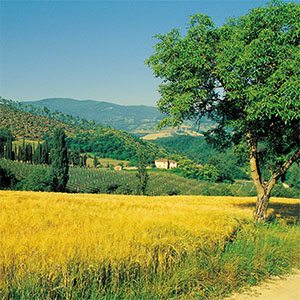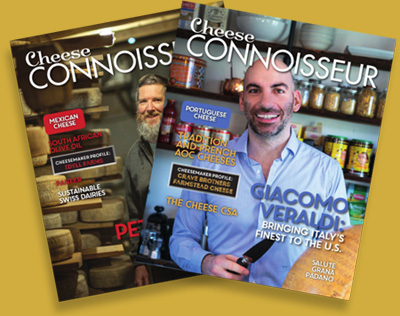Tuscany, known as the birthplace of the Italian Renaissance, is a land of cultural traditions, stunning landscapes, museums and all things artistic. About 9,000 square miles with a population of 3.9 million, the capital is the romantic, charming city of Florence. With seven World Heritage Sites and a simple yet pure cuisine, Tuscany is beautiful, charming and quite tasty.
The cuisine of Tuscany is simple and based on the concept of “cucina povera” or poor cooking. It’s simple meals using simple ingredients that take advantage of local agriculture and can be readily made for large families at a reasonable cost. The hitch is that this simple cuisine is far from unsophisticated. It is based on extraordinary ingredients and its dishes are subtle, nuanced and end up being culinary masterpieces. Bread, beans, roasted meats and wild game, seasonal produce, olive oil, fine wines and sheep milk cheeses are the basis for most meals

A personal favorite is a cold salad of balsamic vinegar-soaked bread tossed with tomatoes and onions, topped with fresh basil and Tuscan olive oil. Or maybe it is the hearty soups made with cannellini beans. And, for a cheese connoisseur like myself, no meal is complete without one of the fabulous, classic masterpieces of the region — sheep milk cheeses called Pecorinos.
Nestled in the Tuscan hills in the area known as Mugello, best known as being the land of the De’ Medici family, is Agricultural Cooperative Il Forteto, producing some of the finest Pecorinos in Tuscany with a story of hippies gone wild — and successful.
In the mid-1970s, a group of idealistic young people gathered to talk about bringing social commitments to the area. They wanted to live as a family and develop programs to help children and adults with handicaps — to create a community where everyone obtained what they needed and shared the bounty of their labors with those less fortunate.
This group also realized it needed to form not just social ideals, but a financial model that assured long-term success. A driving force and belief in the need to share material goods was met with immediate opposition from their families, who felt this was crazy and, to some, actually subversive.
In 1977, the members of Il Forteto began their community on land borrowed from a friend along with 40 sheep, three cows and five pigs. The most likely scenario was that this group would try and then fail, similar to other communes being formed in the United States during that period. Maybe it was idealism, stubbornness or a counter reaction to parental and community opposition that led these committed individuals to persevere and eventually succeed.
There were many years of hardship and struggles, but today there is a miracle in Tuscany that provides a secure home for many people who share a dedication to helping handicapped children and adults achieve their fullest potential. This is a community where everyone is cherished for what they are rather than what others want them to be. In the process, it produces some of the world’s finest cheeses as well as other regional products that excel in an area where fine food reigns supreme.

Now located on more than 1,100 acres, Il Forteto has a herd of 250 Chianina cattle considered to be some of the best specimens of the breed. The cooperative produces some beef, but the majority of the cows and bulls are sold for breeding stock. There are also more than 35 Maremma horses that are used for recreational riding and therapy. All are fed with forage that is grown by the cooperative.
The products grown are sold in the retail shop. An elaborate garden shop is filled with plants and flowers sold to the public. The market shop sells freshly baked bread from the cooperative’s own grains, as well as delicious ice cream and gelato made on premises. The Chianina beef is available along with meats such as the local prosciutto di Toscano. There is also pasta, olive oil from their own orchards, and fresh organic produce.
In the evening, the community dines in the community dining hall, where everyone is welcome and the food is fresh, local and simple in the tradition of Tuscany.
Il Forteto is primarily known for its Pecorino cheeses typical of Tuscany. Pecorino refers to cheeses made from sheep milk. The tradition of using sheep milk dates back to the time of the Etruscans, who were well known cheesemakers.
The first Benedictine monastery comes from this area and it is believed that monks learned the cheesemaking skills they would share during their travels to the rest of Europe from the Etruscans.
Il Forteto is one of the primary exporters of Pecorino di Toscano DOP. Matured 20-30 days, the paste is straw-colored, firm and compact with a sweet, nutty flavor. It is a well-balanced cheese that goes equally well on the table or used in cooking.
Next in line is Pecorino Toscano DOP Stagionato. Aged a minimum of four months, its paste is yellow to white and its flavors are more intense. Suitable for grating, it adds complexity and depth and is prized by Pecorino lovers around the world.

Not all of the cheeses are available in the United States, but the variety available is astounding. Pecorinos (aged in ash), fresh Pecorino Burrata, and Ricotta are just a few. Another favorite is a very young fresh Pecorino aged for only two to three days before the rind can be developed. Very tender and sweet, it is usually served with fresh beans. There also is a soft-ripened cheese called Brinata. Soft with a delicate white mold, the flavor is fresh and bright.
More than 30 different types of cheeses are produced including, Pecorino Toscano; Cacio di Fossa; Pecorino cheeses aged under ashes or with wine; seasoned with truffles; as well as Mozzarella, stuffed Mozzarella, Burrata, Ricotta and Raveggiolo.
The modern dairy was built in 1992 and expanded and updated in 2000. The reason for the expansion was not to leave artisan production behind and develop into an industrial model, but instead to improve consistency, quality controls and food safety. Today, Il Forteto’s cheeses are sold all over the world.
No longer does the cooperative raise sheep to produce milk. Instead, they work with local farmers to raise sheep and produce milk. Only milk from Tuscany is used.
Upon visiting Il Forteto, which is recommended to anyone visiting Tuscany, there is a sense of peace and serenity with people working together in an intense social model where everyone contributes based on ability and members take what they need. There is still a strong commitment amongst all to continue to foster children in need and give them opportunities to grow with love and kindness as well as provide for material needs.

It is easy to see one’s self living there and many people do come to work and live; however, members are cognizant that in the long run this may not work for everyone.
Of course, even the paradise of Il Forteto has its challenges and many find the community not to their liking. There are arguments and disagreements. People leave and new people arrive. Over the long term, however, the community has remained stable. Homes were restored piece by piece and lands were returned to production because of hard work.
Strangely, there is no “work” at Il Forteto in the traditional sense. It is a lifestyle. People look forward to the weekend when harvesting the olives will occur and when asked if this is part of the scheduled workweek, a look of confusion occurs. “We do not have a work schedule, we have a life,” is the answer. CC



